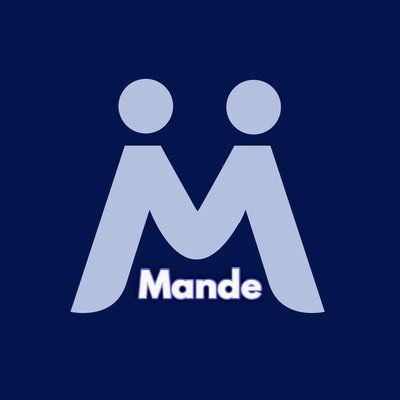Mande Network – introduction. Find out more about the objectives and features of this ecosystem, and get direct access to their official website.
Mande Network is a blockchain platform focused on decentralized identity and reputation systems. It leverages DIDs and ZK proofs for secure, private credential verification. Key features include soul-bound tokens, on-chain reputation tracking, peer-to-peer voting, and DAO attestations.
Mande aims to empower users and foster trust in Web3 ecosystems through its Proof of Credibility SDK. The network’s vision is inspired by the Ubuntu philosophy, emphasizing community and shared growth.
Mande Network – introduction:
The aim of this ecosystem is to build Web3 for citizens. Let’s take a closer look at its objectives, features and benefits.
Objectives
- Decentralized Identity and Reputation System: Create a system that allows users to manage their identities and reputations in a decentralized manner, enhancing privacy and security.
- Credential Verification: Enable secure and private verification of credentials using decentralized identifiers (DIDs) and zero-knowledge (ZK) proofs.
- Trust and Transparency in Web3: Build trust and transparency within Web3 ecosystems by providing reliable and verifiable reputation metrics.
Features
- Soul-Bound Tokens: These tokens are non-transferable and are tied to a user’s identity, ensuring authenticity and preventing fraud.
- On-Chain Reputation Tracking: Allows for transparent and immutable tracking of a user’s reputation based on their interactions and contributions.
- Peer-to-Peer Voting: Facilitates decentralized decision-making through community voting, enhancing democratic participation.
- DAO Attestations: Provides a mechanism for Decentralized Autonomous Organization (DAO) to verify and attest to the credibility of their members.
- Proof of Credibility SDK: A software development kit that enables developers to integrate Mande’s credibility proof mechanisms into their applications.
Benefits
- Enhanced Privacy and Security: By using DIDs and ZK proofs, users’ credentials are verified securely and privately, minimizing the risk of data breaches and identity theft.
- Increased Trust: Transparent reputation systems foster trust among users, as reputations are built on verifiable actions and interactions.
- Streamlined Verification: Simplifies the process of verifying credentials and reputations, making it easier for users to prove their credibility.
- Community-Driven Governance: Peer-to-peer voting and DAO attestations enable more democratic and community-driven governance models.
- Developer Integration: The Proof of Credibility SDK allows for easy integration of Mande’s reputation and identity features into various applications, promoting wider adoption and utility.
Dymension RollApp
Open Reputation Layer: Serves as a transparent and immutable layer to record various aspects of a user’s digital identity.
Credit Ratings and Reviews: Enables the recording of user credit ratings and reviews to build a reliable reputation profile.
Activity and Achievement Tracking: Tracks and logs user activities and achievements within the Web3 space.
Importance of Dymension RollApp in the Mande Network Project
Core Functionality:
- Open Reputation Layer: Dymension RollApp acts as a decentralized and transparent reputation layer within the Web3 ecosystem, crucial for recording and verifying digital identities.
Key Features:
- Credit Ratings and Reviews: It allows for the documentation of credit ratings and user reviews, enhancing the reliability of reputation profiles.
- Activity and Achievement Tracking: It tracks user activities and achievements, contributing to a comprehensive reputation record.
Benefits:
- Trust and Transparency: Provides a verifiable and immutable record of reputation, fostering trust in digital interactions.
- Unified Reputation Management: Offers a cohesive system for managing reputations across multiple Web3 platforms.
- In summary, Dymension RollApp is integral to Mande Network’s goal of creating a trustworthy and transparent reputation system within the Web3 space.
The Proof of Credibility SDK enables developers to integrate decentralized reputation systems into their DAPPs, fostering trust through the following.
$MAND Token Utility
The $MAND token has a three-fold utility within the Mande Network ecosystem:
Staking on Governors:
- $MAND tokens allow holders to participate in governance decisions of the Mande RollApp (L2) by staking on governors.
- Governors vote on your behalf on proposals, suggest changes, or influence the strategic direction of the project.
- Staking on governors provides rewards similar to those in DPoS (Delegated Proof of Stake) chains. This not only incentivizes active participation but also ensures that decisions reflect the collective interests of the community.
Network Gas Fees:
- $MAND tokens are used to pay for transaction fees within the network. This ensures that the network remains sustainable and operational. By using $MAND for gas fees, users contribute to the network’s upkeep and efficiency.
Credibility Staking:
- Users use $MAND tokens as ‘stake’ to vote on the credibility of other users. This unique mechanism ensures that trust is continuously evaluated and rewarded within the network.
- By staking $MAND, a user can increase another user’s reputation score (CRED) within the ecosystem. This process not only enhances the overall trust within the network but also fosters a collaborative environment where users are encouraged to support each other.
Token Release Schedule
- Mande Network RollApp (L2) will have a genesis supply of 20 million $MAND tokens, allocated as per the table below.
The $MAND token model is crafted to bootstrap the Mande Network with well-aligned incentives for key stakeholders and contributors.
